 | |
Brunei | South Korea |
|---|---|
Brunei and South Korea established diplomatic relations in 1984. Brunei has an embassy in Seoul, and South Korea has an embassy in Bandar Seri Begawan. [1]
 | |
Brunei | South Korea |
|---|---|
Brunei and South Korea established diplomatic relations in 1984. Brunei has an embassy in Seoul, and South Korea has an embassy in Bandar Seri Begawan. [1]

South Korea established diplomatic relations with Brunei on 1 June 1984 right after the country gained independence from the United Kingdom on 1 January that year. [1] [2] in 1986, Brunei was one of the countries that boycotted the Asian Games, straining the relations. In 2012, the Bruneian Minister of Education attended the fifth Asia-Pacific Economic Cooperation (APEC) and made a working visit to South Korea. [1] While on the same year, the Korean Deputy Minister of Construction and Water Resources Policy visit Brunei. [1]
Many Korean companies operate and invest in Brunei. [3] Several memorandum of understanding (MoU) on agricultures and fisheries have also been signed. [3] Both countries are also working on in the areas of information technology and tourism. [2] [4] South Korea also keen on helping Bruneians to promote their small and medium enterprises (SME) products in the tourism sector. [5] Some South Korean cosmetics companies have interest in working with Brunei to manufacture halal cosmetics for the regional market and other South Korean companies such as on food also use Brunei halal certification by establishing relations with the Brunei halal companies to export their food products to the Middle East. [6] [7]

Brunei joined ASEAN on 7 January 1984, one week after resuming full independence, and gives its ASEAN membership the highest priority in its foreign relations. Brunei joined the United Nations in September 1984. It is also a member of the Organisation of Islamic Cooperation (OIC), the Asia-Pacific Economic Cooperation (APEC) forum and the Commonwealth of Nations. Brunei hosted the APEC Economic Leaders' Meeting in November 2000. In 2005 it attended the inaugural East Asia Summit.

Foreign relations of the Philippines are administered by the President of the Philippines and the Department of Foreign Affairs. Philippine international affairs are influenced by ties to its Southeast Asian neighbors, China, the United States, and the Middle East.

Fiji–South Korea relations refers to bilateral relations between Fiji and South Korea. The two countries established official diplomatic relations in January 1971, Korea having recognised Fiji's accession to independence the previous year. There is a South Korean embassy in Suva and a Fijian embassy in Seoul. Fiji opened its embassy in Seoul in July 2012 to "foster trade and investment" and to "promote people-to-people exchanges".
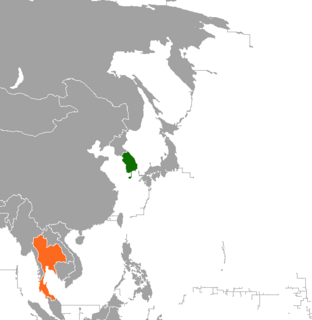
South Korea–Thailand relations are the bilateral relations between the Kingdom of Thailand and the Republic of Korea. The two countries established diplomatic relations on 1 October 1958.

Mexico–South Korea relations refer to the bilateral relations between Mexico and South Korea. There are an estimated 15,000 Koreans and Mexicans of Korean descent living in Mexico. Both nations are members of the Asia-Pacific Economic Cooperation, G-20 major economies, Organisation for Economic Co-operation and Development and the United Nations.

The diplomatic relationship between Pakistan and Brunei is very warm and friendly, primarily because both are Muslim countries and members of the Organisation of Islamic Cooperation. As the two countries are fellow members of the Commonwealth, Pakistan maintains a High Commission in Bandar Seri Begawan, and Brunei has a High Commission in Islamabad. To further foster ties between the two countries, the Brunei-Pakistan Friendship Association (BPFA) was created in 2008.
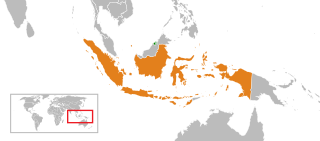
Brunei Darussalam and Indonesia established diplomatic relations in 1984. Since then, both country enjoys warm and friendly relations. Brunei has an embassy in Jakarta, while Indonesia has an embassy in Bandar Seri Begawan. Indonesia and Brunei only share direct land borders on the island of Borneo. Since diplomatic relations were established back in 1984, Overall relations between the two countries were progressing well and that both sides continued to enjoy strong ties in a wide spectrum of co-operations; including trade and investment, tourism, agriculture, marine and fisheries, health, defence, transnational crimes, education, youth, culture and people-to-people contacts.

Israel–South Korea relations refers to the diplomatic, commercial and cultural ties between Israel and South Korea. South Korea has maintained relations with Israel since 1948, and in 1962 both states initiated official diplomatic relations. Israel and South Korea have expressed interest in strengthening the relationship in all areas, particularly defence, but also renewable energy, science and technology, and bilateral trade. Israel and South Korea signed a free trade agreement in 2021.

Brazil–South Korea relations refers to the diplomatic relations between the Federative Republic of Brazil and the Republic of Korea. Both nations are members of the G20 and the United Nations.

Kazakhstan–Malaysia relations refers to foreign relations between Kazakhstan and Malaysia. Kazakhstan has an embassy in Kuala Lumpur, and Malaysia has an embassy in Astana.
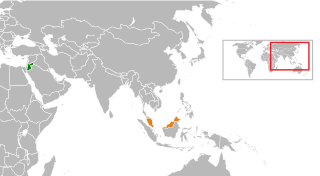
Jordan–Malaysia relations refers to bilateral foreign relations between the two countries, Jordan and Malaysia. Jordan has an embassy in Kuala Lumpur, and Malaysia has an embassy in Amman. Relations between the two countries are mainly in economic co-operation.

Brunei and Cambodia established diplomatic relations in 1992. Brunei has an embassy in Phnom Penh, and Cambodia has an embassy in Bandar Seri Begawan. Both countries co-operate in trade, education and defence.

Brunei and France have had diplomatic relations since 1984. Brunei has an embassy in Paris, and France has an embassy in Bandar Seri Begawan.

Brunei–Japan relations refers to bilateral foreign relations between Brunei and Japan. Brunei has an embassy in Tokyo, and Japan has an embassy in Bandar Seri Begawan.
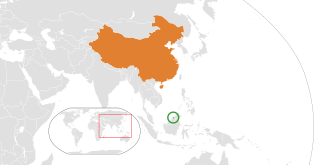
Brunei and China established formal diplomatic relations in 1991. Brunei has an embassy in Beijing, and China has an embassy in Bandar Seri Begawan.

Brunei and Oman established diplomatic relations in 1984. Brunei has an embassy in Muscat, and Oman has an embassy in Bandar Seri Begawan.

Brunei and Qatar established diplomatic relations in 1991. Brunei has an embassy in Doha, and Qatar has an embassy in Bandar Seri Begawan.

Bangladesh and Brunei established diplomatic relations in 1984. Air Vice Marshal Mahmud Hussain is the Bangladeshi High Commissioner to Brunei. Bangladesh is a source of workers for Brunei.
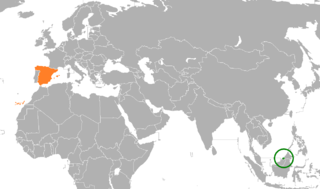
Brunei–Spain relations refers to foreign relations between Brunei and Spain. They established diplomatic relations in 1984. Brunei has no embassy in Spain, but his embassy in Paris, France, is accredited to Spain. Spain has no embassy in Brunei but its embassy in Kuala Lumpur, Malaysia, is accredited for Brunei.